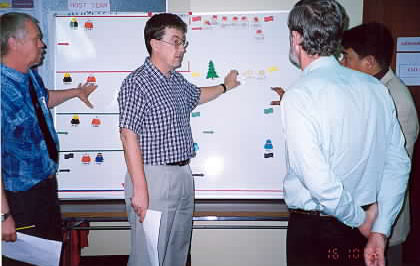|
|
 |
|
ADPC PROGRAMS AND
ACTIVITIES |
Second
Inter-regional Training Course on Public Health and Emergency Management in
Asia and the Pacific (PHEMAP-2)

In collaboration with the World Health Organization Regional Offices for
South East Asia and the Western Pacific (WHO-SEARO and WPRO), ADPC
successfully concluded the two-week PHEMAP-2 course from 7-18 October 2002
in Bangkok, Thailand. The course was attended by 27 participants from 12
countries in Asia-Pacific: Cambodia, East Timor, India, Indonesia, Japan,
Lao PDR, Malaysia, Myanmar, Papua New Guinea, the Philippines, Thailand and
Vietnam.
PHEMAP courses are specifically designed for senior managers from the health
and health-related sectors of developing countries, who have
responsibilities in emergency management policy and practice. Course
candidates are from countries which experience many hazards and also have
the skills and resources needed to implement emergency management programs.
The course dealt with emergencies and disasters from the management
perspective in terms of development and policy issues, rather than as solely
humanitarian response issues. It also introduced the concept of risk
management as a framework for policy-making and planning within national
development processes. In the development context, the course demonstrated
ways to implement risk management policies at community level. It
familiarized health managers with policy, planning and organizational
aspects of risk management and presented current international standards in
technical areas of health and health-related disciplines.
The course objectives were for participants to gain an understanding of:
-
contextual
issues of hazards and emergencies and their public health consequences, in
relation to other health sector and national development
priorities
-
conceptual and technical challenges in measuring disasters and their impact
-
principles of
risk management and general emergency management concepts
-
principles of
health sector damage assessment and needs analysis
-
role of
epidemiology as a tool for decision-making in emergencies
-
principles of
effective management of public health problems in emergency situations
-
current
standards of best practice in technical aspects of specific public health
issues
-
organization
of services for and the management of mass casualties, and
-
the
importance of developing detailed technical guidelines and specific
reporting systems for health sector involvement in emergencies.
Following the guidelines and standards of the
international PHEMAP courses, the Philippines will pioneer the First
National PHEMAP Course in January 2003 in association with the Department of
Health and the WHO-Western Pacific Regional Office in Manila. Other national
courses will be conducted in the near future.
|


